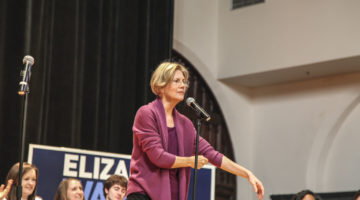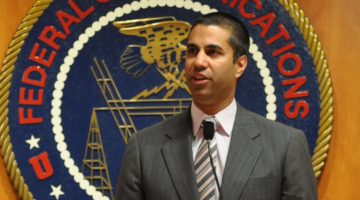
Breanna Denney/Nevada Sagebrush
In this Oct. 29, 2015 file photo, Republican presidential candidate sits during a campaign rally at The Nugget in Sparks. Pundits have roundly criticized Trump’s first debate performance, but many expect the real-estate mogul to benefit from the town hall style of the next debate.
by Jack Rieger
Donald Trump and Hillary Clinton faced off for the first time last Monday night, participating in the first general election debate in what has been an unusual, yet entertaining, election season.
Debates truly represent the fabric of America’s core better than any flag, song or pledge ever could. There’s just a stage, two microphones (apparently one functioning microphone), and the freedom to express your opinions and beliefs in front of the entire country, mostly uninterrupted. Confrontation, disagreement and passion are welcome with open arms, and both candidates understand that every word spoken will be dissected and analyzed through a microscope of criticism and hysteria. At least 84 million people tuned in Monday to compare the two candidates that will fight for the next three months to become the 45th president of the United States. But here’s an interesting question: Do debates actually matter?
The average person in America, who doesn’t spend a lot of time thinking about politics, would assume general election debates have an enormous role in determining the president of the United States because of the massive audience. According to University of Nevada, Reno political science professor Kevin Banda, who earned his Ph.D. in political science from the University of North Carolina, that’s not the case.
“For the most part, general election debates don’t matter,” Banda said.
Nevada’s political science department chair, Professor Eric Herzik, who also has a Ph.D., agrees with Banda’s claim.
“The theoretical civics book answer is that the debate allows people to see candidates and compare them side by side, but the political science data is pretty clear that debates really don’t change people’s minds,” Herzik said.
To the average political observer like myself, this doesn’t make a ton of sense. I assumed the debate stage is where one candidate proves their value to the audience over the other candidate. According to political experts, that couldn’t be further from the truth.
“There are a number of reasons for that,” Banda said. “First, by the time the debates happen, almost everybody has made up their mind anyway. It’s hard to shift attitudes when the people that are watching aren’t persuadable. The other thing to keep in mind is who is watching, and it’s not undecided voters. It’s mostly partisans who have very strong partisan dispositions and very extreme preferences. Those are the least likely people to change their minds.”
Herzik offered a similar reason for debates having minimal significance in determining the president.
“The people who watch debates tend to be far more interested in politics than the average voter, and most of them are coming in already knowing which candidate they’re going to vote for,” Herzik said.
According to both Herzik and Banda, debates are not nearly as important as one would think based on the media coverage. There is a group of undecided voters tuning in who haven’t made up their minds yet on which candidate to vote for, but how big is that group of undecided voters this year?
“Polls are not consistent on this, but I would say there are more [undecided voters] than in the past, primarily because both candidates have such high negatives,” Herzik said.
Banda reiterated Herzik’s opinion, but he was a little more skeptical about how undecided those voters truly are.
“There are more people who are saying they are undecided than is typical at this point,” Banda said. “I don’t know if I believe them, but that’s what they say. A big chunk of those people are younger people. Young people don’t think about politics as much as other people, so I just think they’re less engaged.”
Grading the performances
All major news networks have been grading Trump’s debate performance since last Monday, handing out mostly negative marks. I wanted to understand how Trump’s performance was seen by voters and specifically voters who haven’t decided which candidate to vote for. Herzik was unimpressed with Trump’s performance and specifically his lack of preparation.
“Undecided voters get to see these two candidates side by side for the first time, and Donald Trump did not look good,” Herzik said. “He couldn’t answer specific questions, he interrupted and by the end of this debate it was like, ‘What is this guy talking about?’”
Professor Banda was a little harsher with his criticism of Trump.
“I thought it was the single worst debate performance I’ve ever seen by a candidate,” Banda said. “Policy-wise it was just horrible. Perception-wise, he looked like he was bullying a woman on national TV, which most people are not going to like.”
You don’t need a Ph.D. in political science to realize that Trump failed to prepare for the debate. But here’s the thing: Trump’s conscious decision to not prepare for the debate and to instead rely on his ability to improvise and jab with Hillary is exactly what Trump’s supporters love about him. He isn’t interested in detailing his economic policies; he wants the CNN headline the next morning.
“There is a certain group of people that likes [Trump’s refusal to stay on script],” Banda said. “He looks bad by the standards of political norms, but his supporters are not very happy with political norms right now.”
The problem with Trump’s strategy is that he doesn’t have enough base supporters to win this election. He has to convince undecided voters to vote for him, and according to political experts, there isn’t any evidence he has done that.
“He needs more than his voters to win,” Banda said. “His supporters are going to like him no matter what, just like Clinton’s core supporters are going to like her no matter what. You have to convince other people that they should vote for you as well, and that seems to be a problem for him.”
Herzik agreed that Trump’s best chance of winning this election will come down to his ability to swing undecided voters, many of whom are Republicans.
“He needs to convince Republicans to turn out to vote for him, and there are lots of Republicans who don’t like him,” Herzik said. “And he needs to convince at least some independents to support him.”
While most news stations and editorials had negative marks for Trump’s performance (with the exception of Fox News), Clinton’s debate grade wasn’t quite as obvious. Clinton’s strategy last Tuesday was to bait — or rather allow — Trump to go on his trademark tangents, and she would deliver a more substantial response. Herzik wasn’t overly impressed with Clinton’s performance but recognized her willingness to let Trump rant.
“When your opponent is cutting themselves with a knife, let them keep cutting,” Herzik joked.
Banda had a similar indifference regarding Clinton’s performance.
“It was fine,” Banda said. “She did what she had to do, which was bait him into making himself look bad, which he did a pretty good job of.”
Let’s recap the expert’s opinions. Although Trump performed poorly and failed to provide substantial answers to policy questions, the debate shouldn’t have a significant impact on voters because the audience that watches debates has, for the most part, made up its mind. Also, there is some evidence that suggests there are more undecided voters this year than in previous elections, which is a good sign for Trump, who is desperate for voters outside of his base.
The Next Debate
The next presidential debate will be in St. Louis on Sunday, Oct. 9, and the format will be much different than last Tuesday. The debate will be in the form of a “town meeting,” with half of the questions coming from popular social media topics and the other half coming directly from audience participants, who are supposedly uncommitted voters.
I think this debate format favors Trump for several reasons. First, Trump plays the crowd better and more frequently than any politician would dare to try. He feeds off the crowd’s reaction and uses that momentum to plug hasty one-liners that are replayed on the internet for weeks. This actually hurt him in the previous debate because when he would spew a Trumpism like “that makes me smart” after being accused of paying as little taxes as possible, the audience’s reaction was limited. Someone watching at home may see the audience’s negligible response to Trump’s jab and come to a negative conclusion.
On Oct. 9, the audience will be more engaged and vocalized. This debate will look more like a middle-school recess fight than a presidential debate, and Trump is the school’s most notorious bully. If Trump really wants to get an edge, he needs to find a way to smuggle alcohol into the debate so the audience is even more rowdy (St. Louis is home to Anheuser-Busch, the leading brewer in the United States). Herzik agrees that Trump has an opportunity to do well in the next debate based on the “town meeting” setting.
“The next format is actually better for him,” Herzik said. “The audience will participate more, and Trump works an audience better than Hillary Clinton. Also, the citizen asking the question is not going to ask Trump follow-up questions.”
Given what we’ve learned about debates not having a significant effect on voters, what would be considered a success for Trump in Sunday’s debate? Is it simply about avoiding the massive headline, appearing more presidential or exposing Clinton’s flaws more effectively?
“If the next day people aren’t making jokes about him, that’s a success,” Herzik said. “You don’t want to be the headline the next day.”
But is Trump really capable of avoiding the headline? In other words, does he have the ability to review his prior debate performance and make adjustments to his strategy in an effort to attract more voters?
“I think he’s just going to keep doing what he’s done,” Banda said. “If you read the reports coming out of his camp, it’s that he doesn’t listen to anybody and that he is incapable of staying on script. To a certain extent I feel like if he does any better at all, he will get positive media coverage because then they’ll talk about the big improvement.”
While both Banda and Herzik claim that general election debates don’t have a significant impact on voters, the idealistic part of me wants to believe that they still matter. The brilliance of America is the First Amendment: no matter your personal values, beliefs or background, Donald Trump and Hillary Clinton are going to stand on an enormous stage on Sunday night and exercise their right to free speech. Confrontation, disagreement and debate are healthy American traditions that force people to witness opinions other than their own. That is the essence of American politics.
Jack Rieger is a finance and economics student. You can follow him on Twitter @JackRieger.











